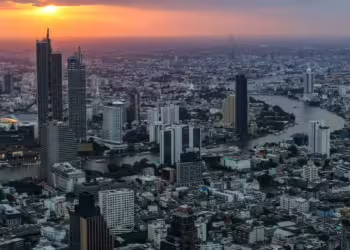No products in the basket.
Thailand ranks 66th (out of 191 countries) on the United Nations Human Development Index (HDI) 2021/2022, up six places from the previous index published by the United Nations Development Programme (UNDP).
The HDI integrates qualitative and quantitative data:
- Life expectancy at birth (which gives an idea of the health status of the country’s population),
- The level of education measured by the average length of schooling and the literacy rate,
- GDP per capita, calculated in purchasing power parity (i.e. by ensuring the same purchasing power in all countries); GDP per capita gives an indication of the average standard of living in the country.
The HDI is presented as a number between 0 and 1. The closer the HDI is to 1, the higher the country’s level of development.
Thailand received a score of 0.8 on the index, with an average life expectancy of 78.7 years, an average of 15.9 years of education and a per capita income of 619,000 baht (US$17,000).
To qualify for the “very high” development group, a nation must receive a score of 0.8 or higher, which Thailand has achieved three years in a row since 2019.
Among ASEAN members, Singapore scored 0.939, Brunei Darussalam with 0.829 and Malaysia with 0.803, followed by Indonesia with 0.705, Vietnam with 0.703, the Philippines with 0.699, Laos with 0.607, Cambodia with 0.593 and Myanmar with 0.585.
COVID then war in Ukraine = devastating impact
The past two years have had a devastating impact on billions of people around the world, as crises like COVID-19 and the war in Ukraine have followed one another and interacted with radical social and economic changes, dangerous global changes and worsening polarization, UNDP says.
More than 90% of countries recorded a decline in their HDI in 2020 or 2021 and more than 40% saw their scores fall in these two years, signaling that the crisis continues to worsen.
While some countries are beginning to get back on their feet, the recovery is uneven and partial, further widening inequalities in human development. Latin America, the Caribbean, sub-Saharan Africa and South Asia were particularly affected.
Cost of living and energy crisis
“The world seeks by all means to respond to consecutive crises. We have seen with the cost of living and energy crises that, while it is tempting to bring quick solutions such as fossil fuel subsidies, immediate relief tactics are delaying the long-term systemic changes we need to make,” said Achim Steiner, UNDP Administrator.
“We are collectively paralyzed in the face of these changes. In a world defined by uncertainty, we need a renewed sense of global solidarity to address our common and interconnected challenges. »
The report believes that “the way insecurity and polarization feed each other today to hinder the solidarity and collective action we need to address crises at all levels” prevents the necessary changes.
“Even before COVID-19 hit, we were witnessing the double paradox of progress associated with insecurity and polarization. Today, with a third of the world’s people feeling stressed and less than a third of the world’s people trusting others, we face major barriers to adopting policies that work for people and the planet,” says Achim Steiner.
“We have a narrow niche to revive our systems and ensure a future based on decisive climate action and new opportunities for all.”
Thailand Again Ranks “Very High” on UN Human Development Index (prd.go.th)
Human Development Index | Human Development Reports (undp.org)
Discover more from Thailand Business News
Subscribe to get the latest posts sent to your email.














